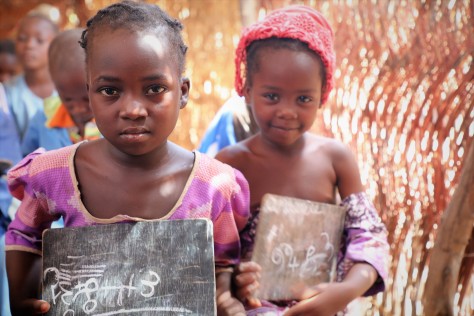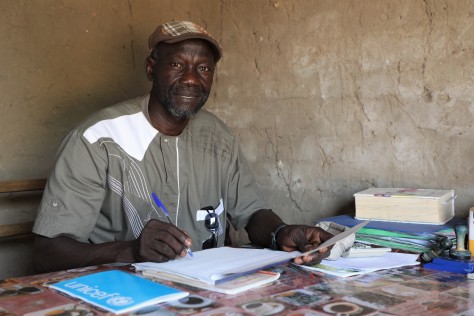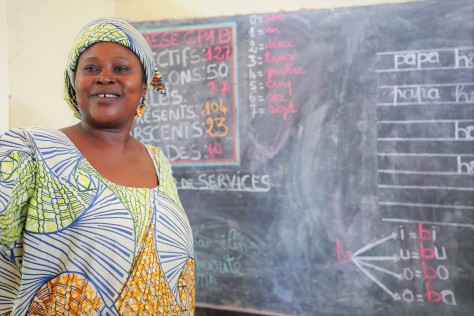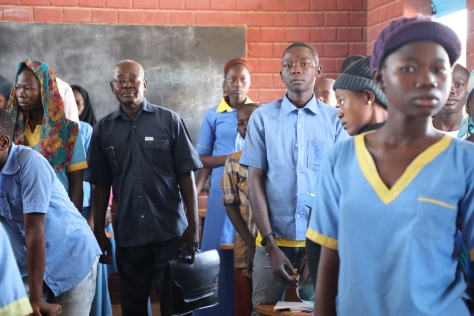In Chad, a project to improve learning conditions and environment is bringing back thousands of out-of-school children on school benches.

It only takes a quick glance to see the contrast. Bits of words and voices can be easily heard from the lessons taught afar, but in place of sheds under which teachers and children used to gather are new buildings standing. Four new buildings that have become the pride of the school “5 Octobre” and its community. “We used to do our class under sheds, which had to be renewed every year. Today it is not only nicer but also safer for our school children” explains Paul Beinde, the Director of the school.
In Chad, one out of two children attend primary schools and less than 40% will eventually complete their primary education. Lack of school facilities, limited intake capacities, coupled with socio-economic barriers continue to hamper the education of children. Promoting access, attendance and retaining children in schools require establishing fair conditions and environment for children to learn. For Paul Beinde, the project has demonstrated exactly that.

“Since we have the new buildings, we have seen more and more children joining. We had about 1,100 children before. This school year, there are 1,600” stresses Paul quite proudly. A positive change that cannot be explained by new facilities alone.
Esther Kinga, community teachers at the school confirms Paul’s observation. « The new buildings have attracted many primary school children. You can see it with the size of my class this year.” First-hand witness, Esther is also one of the agents leading this change. Community teachers represent about 64% of school teachers in Chad, and carry heavy responsibilities in helping children grow their potential ; which is not an easy task for those who have not always the qualifications needed.

Under the project, Esther has been trained along other community teachers on lessons preparation and presentation. A training that has boosted her motivation and confidence in her ability to not only carry out her job but bring the best opportunities for children. “The training helped me improving my teaching skills and I believe that I am now able to give the same chance to my students than those in big cities” she comments with the energy of those dedicated to a noble cause. “Now it is my turn to do my part of the job, for them to become an engine of change for their future and the one of our country.”
It takes a village to raise a child tells the saying and in the present case to bring and sustain change. Along with teachers, parents play a critical role in the education of their children. This is even more true in Chad, where about half of the schools are community schools, and parents, those who would keep schools alive, supporting wages of community teachers, as well as the management of school facilities. « Our role is to make sure that our children learn in the best conditions and this starts with maintaining the buildings and equipment’s that have been donated” tells Benadji Luciano, 52, the Secretary General of the Parents’ Association.

Supporting parent’s association also means giving them the ability to contribute to a better educational environment for their children and Mr. Benadji was one of the 570 members of the Parent Teacher Association trained under the project on the maintenance of classrooms. “We come often to visit and make sure students don’t lack anything. A good school environment, helps children to learn. This is also why we explain to them the benefit of maintaining their school and its furniture in good conditions” explains Benadji.
For the school “5 Octobre”, the mobilization and commitment of teachers and parents in improving learning conditions and environment has created critical changes in the life of the children of the area, including those who were until now kept out of the system. And as new children enroll in schools, new chances are given not only to children but to a whole community to believe in a better future and greater chances in life.
—————————
The Project for Revitalizing Basic Education in Chad (PREBAT) is contributing to increasing access to primary education and quality education through improving school learning environment, including the construction and furnishing of classrooms, latrines and boreholes, as well as the provision of learning materials and school feeding programmes. Thanks to the Education Above All Foundation, under the funding of the Qatar, UNICEF has provided 237 new classrooms and improved WASH facilities to 68,412 out-of-school children in 11 regions of Chad, while supporting in parallel enhanced quality learning and teaching for 1,034,000 students in grades 1 and 2 and their teachers through distribution of books and pedagogical guides.

